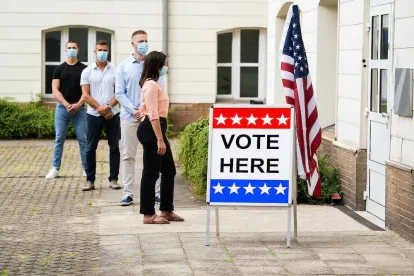Election Day 2020 is days away. Early voting records have been shattered, with tens of millions of voters already casting their ballots by mail or in-person early voting. Despite these record early voting numbers, tens of millions more will still vote in person on November 3. Some of those Election Day voters are certain to be your employees.
Because Election Day is Constitutionally mandated to fall right in the middle of the workweek, voting and work obligations will conflict for millions of employees and employers nationwide, notwithstanding the new work-from-home reality many of us now live in. Employees will surely seek time off to cast their ballots or otherwise assist in the democratic process, and it is important for employers to understand their rights and obligations with respect to employee voting and election officer leave.
There is no federal law outlining the rights of voters to take time off on Election Day, but most states have statutes that lay out what employers can and cannot do when employees seek leave to vote. Below is a brief summary of the state laws that govern how employee voting leave should be treated. Each state law is unique, and you should consult the statutory language and your attorney before crafting Election Day leave policies.
States with No Voting Leave Provisions
If you’re an employer in Connecticut, Delaware, Florida, Hawaii, Idaho, Indiana, Louisiana, Maine, Michigan, Mississippi, Montana, New Hampshire, New Jersey, North Carolina, North Dakota, Oregon, Pennsylvania, Rhode Island, South Carolina, Vermont, Virginia, or Washington, you are not legally obligated to give your employees time off to vote. Many employers in these states, however, may choose to act in the spirit of states like North Dakota, which recommends that employers “encourage voting” amongst employees. Employers that voluntarily provide voting leave should communicate leave rights and expectations to employees prior to Tuesday.
States with Unpaid Voting Leave Provisions
Alabama, Arkansas, Georgia, Kentucky, Massachusetts, and Wisconsin require employers to provide unpaid leave to employees who seek time off to vote. The range of hours each employee can receive varies widely by state.
| Alabama | Employees may receive up to one hour of unpaid leave, upon reasonable notice to the employer. |
| Arkansas | Employers should provide employees “time to vote” on Election Day. |
| Georgia | Employers must grant employees up to two hours of unpaid leave. |
| Kentucky | Employees are entitled to a “reasonable time” but not less than four hours of unpaid time to vote. |
|
Massachusetts
|
Employees are entitled to two hours of unpaid leave, but only at the outset of the polls opening, and only for employees working in manufacturing, mechanical, or mercantile establishments. Employees working outside of those fields are not guaranteed any Election Day leave. |
| Wisconsin | Employers must grant employees three successive hours of unpaid leave to vote. |
Employers should be familiar with the details of their state’s voter leave laws in order to adequately handle employee requests for time off. Each state has its own intricacies – some require employees to request leave within a certain timeframe, others allow employers to set the time and manner of an employee’s voting leave request. Finally, several states have provisions that permit employers to deny voting leave from an employee where the employee has a certain amount of time off-the-clock while the polls are open. Review state law or consult with counsel to determine best practices in your state and for your business.
States Requiring Paid Voting Leave
Most states require employers to provide paid time off for employees who request it on Election Day. Broadly speaking, five states – Arizona, Iowa, Missouri, Tennessee, and West Virginia – allow employees to receive up to three hours of paid time off on Election Day. Eleven states – California, Colorado, Illinois, Kansas, Maryland, Nebraska, New Mexico, New York, Oklahoma, South Dakota, and Utah – give employees two hours of paid time off. Wyoming grants employees one hour of paid time off to get to the polls.
Other states have more unique provisions. Alaska and Texas do not proscribe a limit on the number of hours an employee can take off to vote, but allow employers to refuse paid time off if an employee has two consecutive non-working hours in which to vote. In Minnesota, employees are permitted to be absent from work “for the time necessary to appear at the employee’s polling place, cast their ballot, and return to work on the day of the election.” In Nevada, employees are given a “reasonable time” to vote – one hour if their workplace is less than two miles from their polling place, two hours if between two and 10 miles, and three hours if more than 10 miles. Finally, in Ohio, employees can take up to two hours to vote, but those hours are only paid for salaried employees. Hourly wage workers receive the two hours off, but they are unpaid.
Each state has its own unique requirements to make employees eligible for the paid leave. Several states require advance notice, while others limit the leave to situations in which an employee does not have enough consecutive nonworking hours in which to vote. Some states, like Missouri, require an employee to actually vote to receive the time off.
Election Official Leave
Every city, township, and county needs workers to staff its polling stations, and employees will inevitably seek to volunteer to contribute to the democratic process as election officials. Certain states have statutory protections for such employees, and require employers to grant leave or at least refrain from discriminating against workers who choose to volunteer or serve as election officers. These states include California, Delaware, Kentucky, North Carolina, Ohio, and Wisconsin.
With the COVID-19 pandemic leading to an increase in early vote-by-mail and in-person voting, as well as work-from-home arrangements, there may be concern that employees will fraudulently request voting leave when they have already participated in the democratic process. Tread carefully before disciplining employees for any suspected abuse. Employees who planned to vote-by-mail may become concerned about ballot receipt deadlines or other issues, and change their plans. Conduct a full and thorough investigation of the facts and stay apprised of the law in your state before disciplining employees for such offenses.
As the 2020 Election creeps closer and closer, it will be imperative that each employer come up with a plan for handling Election Day leave requests. Happy voting, everyone!




 />i
/>i

